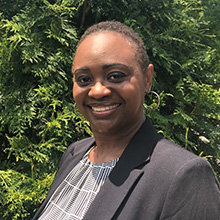It’s mid-April, a time when my Outlook calendar begins to beep repeatedly in anticipation of the annual RIMS conference. While you surely have most of your regular appointments, sessions
One of these is the BIG Diversity series RIMS has planned this year. The events are designed to focus on the unique attributes all workers’ comp professionals bring to the table and help us better address these qualities in our industry. I’m particularly interested in a session on Tuesday, April 17 when Genex’s Chikita Mann speaks on “Diversity Training: How to Handle LGBTQ Issues with Cultural Sensitivity.” I recently spoke with Chikita and asked her to give us a preview of BIG Diversity and her session.
Tom Kerr (TK): Chikita, what are your thoughts on the content that will be discussed during the RIMS diversity platform this year?
Chikita Man (CM): It is a subject that I think needed to be addressed in workers’ comp for quite awhile, however, I think in the past, many people didn't know quite how to address it. But now we have more information to help us better understand and include everyone, regardless of background, regardless of sexual orientation, regardless of ethnicity. And this information is not only important in working together in the
TK: And how will you address diversity challenges in your session?
CM: In my session, we'll focus on diversity training specifically related improving outcomes for injured workers in the LGBTQ community. When we look at health care disparities with this population, we find they’re not as recognized or addressed as those involving race and ethnicity. In fact, studies have shown that LGBTQ individuals are more likely to delay or not receive the medical treatment they need because of prior discrimination. For instance, statistics show lesbian women are more likely to avoid seeking or obtaining preventive gynecological testing, like Pap smears and mammograms that are vital for healthy living.
Also, unfortunately, we find that members of this community are at higher risk of substance and alcohol abuse. This is partly due to past stigmatization, discrimination and lack of knowledge regarding their health care concerns in the medical community.
TK: With this information in mind, what are some ways workers’ comp professionals can better address diversity issues when handling workers’ comp claims?
CM: It’s really about understanding how awareness of ethnic, racial and generational diversity fosters unbiased, sensitive claims responses. Specifically, how we, as workers’ comp professionals, can increase our cultural competence to improve claims management and outcomes for the LGBTQ and other communities. To become culturally competent, the workers’ comp professional needs to make a conscious effort to understand the traditions, values, and beliefs of a specific population. And it’s really an ongoing process that begins with communication.
TK: Can you give me an example of how communication impacts
Communication has the power to unite or divide, so we need to use it effectively to break down barriers
TK: So what do you hope RIMS attendees will come away with after participating in your session?
CM: I hope attendees leave with the perspective that we all are human and all basically have the same needs. We want to be appreciated, we want to be included, we want to be heard. So, I want to encourage attendees to build their knowledge about this population and become more familiar with their unique needs and medical concerns. Also, I hope attendees will gain a better understanding of how the lack of cultural competency in the industry has not only affected injured


